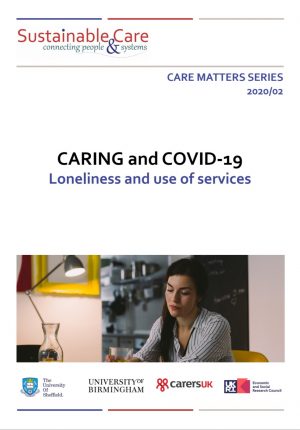Carers report greater loneliness, difficulty getting help from services, and poorer financial wellbeing

Two new research reports were published this month by the Universities of Birmingham and Sheffield, in partnership with Carers UK, in the Sustainable Care programme’s Care Matters series:
These reports look at unpaid carers’ personal experiences during April and May 2020 and found evidence of significant negative outcomes.
Unpaid carers support people who need help to manage everyday activities, usually because of illness, disability or advanced age. Research shows that, even in ‘normal’ times, providing care tends to have negative effects on carer’s lives and, in particular, on their health and financial situations.
Loneliness and the use of services
Lockdown made life even more difficult for carers, who were affected more than most by the restrictions which increased isolation and loneliness.
Many people were unable to access services, both NHS and social care, with carers affected more than others. For example, 9 in 10 carers awaiting an NHS treatment had it postponed or cancelled, compared to 8 in 10 other people.
Financial wellbeing
During the pandemic, the UK Government restrictions included closing many workplaces and introducing the furlough scheme.
This report looks at the impact on carers’ financial wellbeing, their hours of paid work – before and during the pandemic – and their experience of the furlough scheme. Results indicate a lower level of ‘financial wellbeing’ for many carers.
In May 2020, 1.3 million carers felt under a degree of financial pressure – with women aged 31-45 particularly affected. Male carers, and carers aged 17-30, were more likely than others to be on furlough, so carers’ access to paid work and to secure incomes in the months ahead is an issue that may well affect future financial wellbeing, as the furlough scheme ends and unemployment increases.
